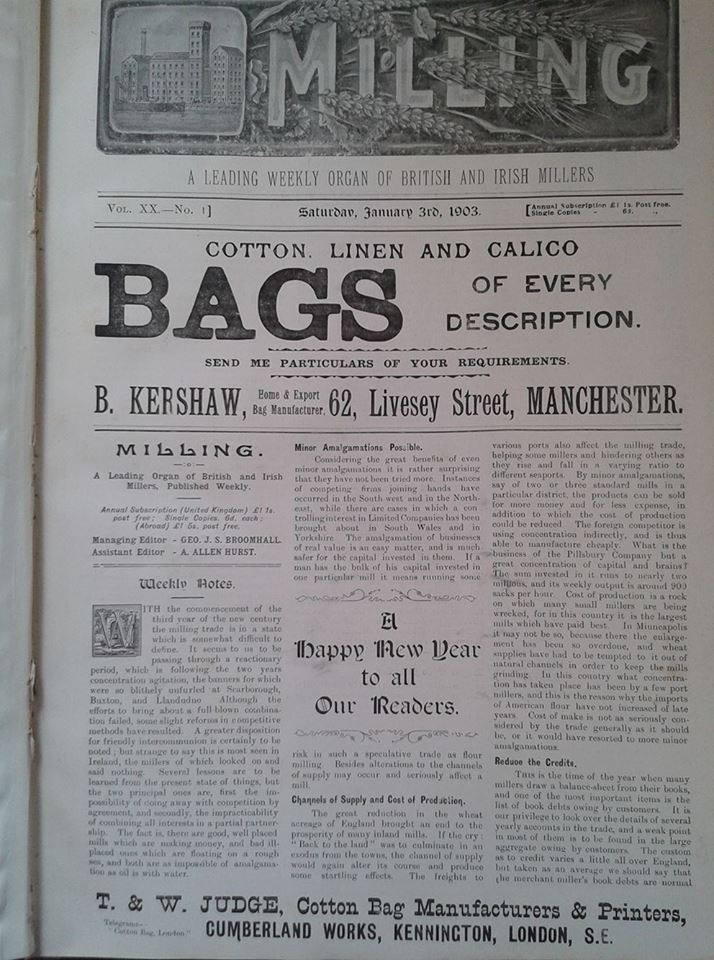Journals: Milling/Milling and Grain


Following on from The Miller, a new journal was published in 1891 to try and rival it, it was called Milling. G. J. S. Broomhall was the founder of Milling, with the first publication coming out on 6 November 1891. He had previously founded The Liverpool Corn Trade News in 1888 after being an invoice clerk with Alexander & Co., grain merchants. After having successfully developed The Liverpool Corn Trade News, which, from 1895 onwards, was known as George Broomhall’s Corn Trade News, he started a new venture with Milling. It took some time for this publication to become established as The Miller was very much the main publication for miller’s at the time. Indeed, at first, Milling was only published fortnightly and was fairly ‘modest in size and scope’ (Jones, p.20). However, it soon developed, grew, and surpassed The Miller.
This growth and surpassing of The Miller started to be felt around 1900 and had as much to do with the materials used to produce the work as the content. The Miller had been published on news print quality paper whilst Milling was slightly larger in size and soon published on heavier, shiny paper. Whilst The Miller had contained some illustrations, Milling devoted entire pages to photographic illustrations and included ‘highly detailed accounts of leading mills and millers’ (Jones, p.21). It did share features with The Miller, such as advertisements, descriptions of mills, and details on the milling conditions throughout the English counties. However, despite the similarities, it was the differences that helped Milling advance and become the leading milling journal.

Indeed, this can be seen today given the fact that Milling survives whilst The Miller does not. This survival was by no means guaranteed and the publication has been recently rescued within the past 10 years. Perendale Publishers started publishing Grain and Feed Milling Technology in 2007 as a rebranded version of Milling. At this time, only 6 editions were being published a year compared to the weekly edition that Broomhall had produced. However, since Perendale Publishers took it over, the publication has seen a revival as it is now produced monthly under the name, Milling and Grain. Also different with this publication is the international audience. Whilst Milling was mainly focused on Great Britain, Milling and Grain covers international topics and the magazines themselves are translated into many different languages including French, Spanish, Chinese, Turkish and Arabic.
Whilst there are many differences, similarities can also be found between Milling and Grain and its ancestor, Milling. This comes from the content. There are still features such as ‘Milling News’ and ‘Columns’ along with other articles. Adverts are still prominently displayed and photographic illustration is still key. A reader from 1891 would therefore be able to recognise the subjects and format of the publication but they may not recognise the different ways the publication can be accessed. As well as being printed, each edition is available digitally and there is an archive on their website with past editions. G. J. S. Broomhall could never have dreamt how vast and accessible his journal would become. Indeed, new publications have been created as a part of the Milling family including The Global Miller, an online daily news service, and The International Milling and Grain Directory which is published annually, along with an online version, and contains products, services and companies related to the milling industry.
So, a small journal published by one man in Liverpool at the end of the 19th century is now a worldwide publication with a big digital presence. Clearly the need for journals and magazines in the world of milling has not diminished today.
